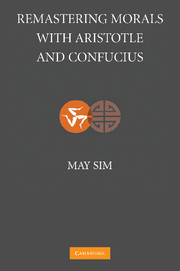Book contents
- Frontmatter
- Contents
- Acknowledgments
- Abbreviations
- Introduction
- 1 Aristotle in the Reconstruction of Confucian Ethics
- 2 Categories and Commensurability in Confucius and Aristotle: A Response to MacIntyre
- 3 Ritual and Realism in Early Chinese Science
- 4 Harmony and the Mean in the Nicomachean Ethics and the Zhongyong
- 5 The Moral Self in Confucius and Aristotle
- 6 Virtue-Oriented Politics: Confucius and Aristotle
- 7 Making Friends with Confucius and Aristotle
- Glossary of Chinese Terms
- Name Index
- Subject Index
2 - Categories and Commensurability in Confucius and Aristotle: A Response to MacIntyre
Published online by Cambridge University Press: 18 July 2009
- Frontmatter
- Contents
- Acknowledgments
- Abbreviations
- Introduction
- 1 Aristotle in the Reconstruction of Confucian Ethics
- 2 Categories and Commensurability in Confucius and Aristotle: A Response to MacIntyre
- 3 Ritual and Realism in Early Chinese Science
- 4 Harmony and the Mean in the Nicomachean Ethics and the Zhongyong
- 5 The Moral Self in Confucius and Aristotle
- 6 Virtue-Oriented Politics: Confucius and Aristotle
- 7 Making Friends with Confucius and Aristotle
- Glossary of Chinese Terms
- Name Index
- Subject Index
Summary
Alasdair MacIntyre argues in “Incommensurability, Truth, and the Conversation between Confucians and Aristotelians about the Virtues” that despite certain agreements about the virtues, Confucian and Aristotelian traditions are ultimately incommensurable. By this, MacIntyre means that each of these systems “has its own standard and measures of interpretation, explanation, and justification internal to itself,” so that when dealing with rival claims, there are “no shared standards and measures, external to both systems and neutral between them, to which appeal might be made to adjudicate between” them. For instance, a Confucian may notice that an act of giving fails to conform to li (ritual propriety) (e.g., one might have neglected to use both hands and bow in the act), a lack that prevents the act from being truly generous and the agent from being ren (the highest Confucian virtue – sometimes translated as benevolence, humaneness, or authoritative conduct). Such an omission, according to MacIntyre, is necessarily “invisible to the Aristotelian.” The Aristotelian, who lacks even the words to translate li, therefore would fail to see the moral shortcoming. By the same token, an Aristotelian may notice that an act fails to conform to the order of the psychê (soul) for a citizen of a polis (state), where both psychê and polis are understood in very specific teleological ways. The shortcoming is “invisible” to the Confucian because the standard is lacking – the Confucian even lacks the words for psychê and polis.
- Type
- Chapter
- Information
- Remastering Morals with Aristotle and Confucius , pp. 49 - 71Publisher: Cambridge University PressPrint publication year: 2007

